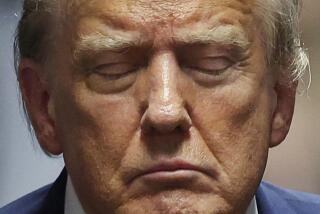Sleepy Juror Gets Rude Awakening
Juror No. 2386 had been sitting in a downtown Los Angeles courtroom for two days, waiting to be grilled by lawyers, when he let out a loud yawn.
“You yawned rather audibly there. As a matter of fact, it was to the point that it was contemptuous,” said Superior Court Judge Craig Veals, who was presiding over jury selection for an attempted murder trial.
“I’m sorry, but I’m really bored,” the juror replied.
“I’m sorry?” the judge responded, and the juror repeated his statement.
The judge called his attitude “lousy.”
“Your boredom just cost you $1,000.... I’m finding you in contempt,” Veals said, according to an April 1 court transcript. “Are you quite so bored now?”
After the juror balked at paying the $1,000, Veals slashed the fine to $100, but not before the juror had spent up to two hours detained in a jury assembly room.
Veals declined to comment, but a court spokeswoman said the judge had to maintain order in his courtroom.
The juror “was being disruptive in the courtroom,” said Pat Kelly. “The judge said, ‘Maybe you need a little time out.’ ”
But some courtroom observers said Veals, a former prosecutor, overreacted to a common reaction to jury service, which often involves hours or even days of sitting in a drab, windowless courtroom.
“I’ve seen judges fall asleep and yawn on the bench,” said Richard Hirsch, a Los Angeles trial lawyer for 38 years and past president of California Attorneys for Criminal Justice. Veals, he added, could have “made light of the situation, ordered the juror to get a cup of coffee.... I think the judge should have taken a ‘time out.’ ”
Officials declined to identify the juror, citing court policy of withholding jurors’ names in criminal trials.
California law permits judges to fine anyone up to $1,500 “to preserve and enforce order” in the courtroom and “to compel obedience” to lawful orders.
After the judge imposed the $1,000 fine, Veals and the juror continued to discuss why he had yawned.
The juror explained he had had two surgeries on his tailbone that made it difficult to sit still, and that previous bouts with pneumonia made him sleepy when he didn’t drink enough water.
“Let me just make a record. It was very loud,” Veals said of the yawn. “It was a definite interference with what I have been trying to accomplish here.... I can’t run a court when I have someone behaving the way you did. I have had people yawn audibly in the past, but that had to take a record. That was downright disruptive.”
The juror “yawned very noticeably and waved his arms around and made quite a show of his yawning process,” said Allan Parachini, a court spokesman.
Veals also chided the juror for interrupting him three times during the discussion.
Because the juror did not have a checkbook, Veals ordered him to return to court on April 4. Veals also ordered the juror not to talk to anyone about what happened, calling it “privileged information.”
That Monday, the juror balked at paying the $1,000 fine, according to court documents. Veals ordered him detained in an attorney conference room, behind the courtroom, according to interviews. The detention lasted no more than two hours, said Kelly, of the court’s public information office.
After the juror came out, Veals reduced the fine to $100, and the juror paid it the following day.
Criminal courts attorneys said they had never heard of such treatment of jurors who report for duty, a rare breed.
During the fiscal year that ended June 30, 2004, 2.9 million jury summonses were mailed to Los Angeles County residents to try to drum up the 10,000 jurors needed daily, but the response rate was only 41%, authorities said.
The problem has gotten so bad, the court is now holding hearings to fine juror no-shows.
“It’s pretty extreme,” Joel Isaacson, a longtime criminal defense lawyer, said of Veals’ action. “You hear of juror misconduct -- jurors conducting experiments on their own, talking to witnesses during trial -- but making an audible loud yawn during jury selection?”
But others backed Veal’s action.
“The judge has to enforce the proper atmosphere in the courtroom. That means seriousness, courteousness and respect,” said Bill Caldarelli, a San Diego litigator and chairman of the litigation section executive committee of the State Bar of California. “The judge has to be an authority figure.... What you don’t want to do is to lose the respect and attention of the rest of the jury pool.”
As for juror No. 2386, he rejoined the jury pool and was questioned by attorneys in the attempted-murder case, but was not selected, said Parachini, the court spokesman. “He was then informed that he had completed his jury service and would not be called back again within a year.”
More to Read
Sign up for Essential California
The most important California stories and recommendations in your inbox every morning.
You may occasionally receive promotional content from the Los Angeles Times.










